Seborrheic dermatitis is more well-known for one of its symptoms: dandruff. Around half of the adult population struggles with dandruff and other symptoms caused by seborrheic dermatitis, which is why we at Divi have decided to shed some light on what causes the condition and what you can do to treat it.
Divi's Shampoo, Conditioner and Scalp Serum can all help alleviate dandruff and may also help treat some of the symptoms caused by seborrheic dermatitis, since the two commonly go hand in hand.
What Are The Causes Of Dandruff?
Dandruff is not precisely a condition on its own and is instead a symptom of seborrheic dermatitis, so the right question is what causes seborrheic dermatitis.

There is no single definitive cause of seborrheic dermatitis, but doctors have pinpointed two factors correlating with the condition. Both relate to excess oil on the scalp.
The first factor relates to the scalp overproducing oil, which may be driven by many different external factors, such as:
- Detergents, shampoos and conditioners containing harsh chemicals
- High-stress levels
- Obesity
- Environmental irritants, such as pollen, tobacco smoke, pollution, etc.
- Dry, cold weather
- Certain medications, such as lithium, psoralen, interferon and psoralen
- Medical conditions such as Parkinson's and HIV
- Certain skin care products containing alcohol
- Other skin issues, such as acne
- Hormonal changes
The other factor causing seborrheic dermatitis and dandruff to develop is when a type of yeast called Malassezia globosa, which occurs on the body naturally, multiplies at a faster rate than usual.
This yeast infection often presents in irritated scalps, which triggers an increase in oil production and often leads to seborrheic dermatitis and, therefore, dandruff.
What Are The Signs And Symptoms Of Dandruff?
While seborrheic dermatitis can occur on almost any oily part of the body, it often appears on the scalp. Some of the symptoms of the condition that you should look out for on the scalp include:
- Oily hair
- Itchy scalp
- Dandruff
- Scaly patches of skin on the scalp
- Redness
- Hair loss in the affected area
If you have a more severe case of seborrheic dermatitis, erythematous plaques may begin forming solid patches of thick, crusted and elevated skin. If these plaques remain untreated, they can thicken, become greasy and yellow, and cause secondary scalp infection.
While dandruff is the most common symptom of seborrheic dermatitis, it can often be confused with dry scalp, as both conditions share the symptom of a flaking scalp. Below, we will list some key differences between dandruff and dry scalp to help you figure out which you might be suffering from, so you'll be able to treat them effectively.
Some of the symptoms exclusive to dandruff caused by seborrheic dermatitis are:
- Large, oily, yellow or white skin flakes
- Oily, scaly, red skin on the scalp
Symptoms that are exclusive to dry scalp are:
- Smaller, drier skin flakes
- Dry skin on the scalp and other parts of the body
How Does Divi’s Scalp Serum Help With Treating Dandruff?
Seborrheic dermatitis and its symptoms, such as dandruff, can be incredibly irritating to deal with, as the condition will cause scalp itchiness and leave your clothes covered in skin flakes.
At Divi, we know no one wants to deal with scalp concerns like these, so we developed our Scalp Serum to help fight dandruff.
We use clean ingredients in our Scalp Serum, and unlike some other brands of dandruff shampoo on the market, we do not include fragrances or harmful chemicals capable of leading to a harmful product build-up.
Divi's Scalp Serum is designed to remove product build-up. So if you've been using low-quality hair products for too long, give your scalp the cleansing it deserves with Divi's Shampoo, Conditioner, and Scalp Serum.

While you may think normal shampoo will give you healthy, fresh-smelling hair, some of these products contain harsh ingredients, which can clog the pores on the scalp and increase sebum production, leading to an overproduction of oil.
In contrast, combining Divi's Scalp Serum with our healthy, fragrance-free Shampoo & Conditioner can treat some of the symptoms of seborrheic dermatitis, like dandruff, and improve the health of your scalp overall.
What Ingredients Does Divi’s Scalp Serum Contain for Treating Dandruff?
We only use science-backed ingredients, but you may wonder what exactly these ingredients are and how they can help you treat seborrheic dermatitis and dandruff.
So what goes into our products, and how can they help combat dandruff?
Tea Tree Oil
Tea tree oil is an essential oil extracted from the leaves of tea trees. The aboriginal people of Australia have been using it for centuries to treat infections and clean wounds, as it has some medicinal properties.
Tea tree oil can often be found in many different soaps, skincare and hair care products, as it is antimicrobial, which means it can fight bacteria and fungi.
These antimicrobial properties can help fight Malassezia globosa as a cause of seborrheic dermatitis. Tea tree oil can reduce the amount of oil on the scalp, as Malassezia globosa can cause more oil production than is necessary for a healthy, hydrated scalp.
Peppermint Oil and Menthol
Peppermint oil is extracted from peppermint plants and is used in many scalp serums. It contains a beneficial compound called menthol, which is responsible for many medicinal properties offered by peppermint oil. It also provides peppermint with its signature smell and "icy" sensation.
Peppermint oil offers various medicinal properties, such as antimicrobial, pesticidal, insecticidal, vasodilating and anti-inflammatory, in addition to working as an analgesic and anesthetic agent. Many of these properties can help reduce the impact of symptoms caused by seborrheic dermatitis.
Peppermint oil's antimicrobial properties can help reduce Malassezia globosa on the scalp, just like tea tree oil, thereby reducing oil on the scalp. Peppermint oil being an anti-inflammatory agent means it can reduce redness on the scalp caused by seborrheic dermatitis.
The analgesic properties of peppermint oil can help relieve itchiness caused by seborrheic dermatitis, which can help you stop scratching your scalp.
Copper Tripeptide-1
Copper peptides, such as copper tripeptide-1, are valuable additions to beauty and skin care products. Peptides are chains of amino acids that form proteins and connective tissues, such as elastin and collagen, which are essential to keeping your skin firm and smooth.
Copper peptides have been shown to promote hair growth and stimulate hair follicles, which correlates with increased blood flow. This increased blood flow can improve the overall health of your scalp, which can reduce the possibility of you having a seborrheic dermatitis flare-up and dandruff.
Scientific Research Supports Divi’s Scalp Serum
Divi chose dermatologist-tested ingredients for their effectiveness in combating dandruff and other scalp conditions. A healthy scalp often means healthy hair, so here's a bit more background on why we use the ingredients we do.
A clinical study in 2014 was conducted on tea tree oil's effects on someone suffering from seborrheic dermatitis, and they were given a shampoo containing 5%tea tree oil. The participants who used the shampoo reported that it caused a 41% reduction in dandruff after using it daily for four weeks.
A 2018 research review found that copper can maintain the tissues in blood vessels, so serums containing copper peptides can potentially increase blood flow and reduce dryness on the scalp.
Another study conducted in 2014 shows peppermint oil helped mice hair grow back faster and thicker while also improving blood flow to undernourished hair follicles.
These research studies support the notion that Divi’s Scalp Serum is made with ingredients capable of increasing blood flow to the scalp, soothing the scalp, and improving overall scalp health.






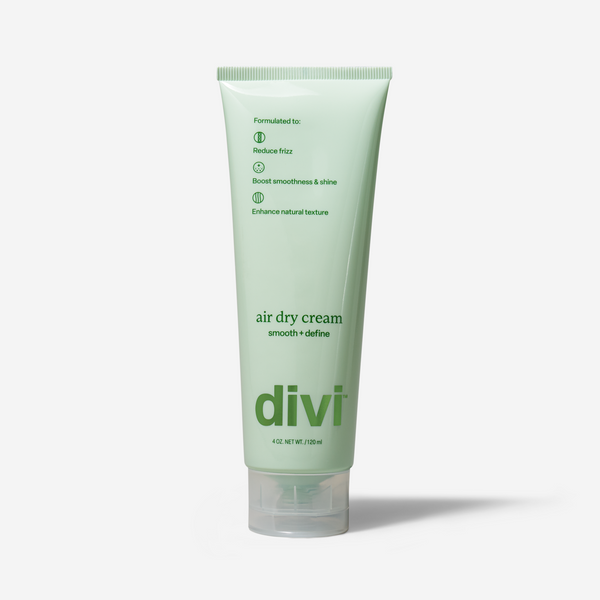
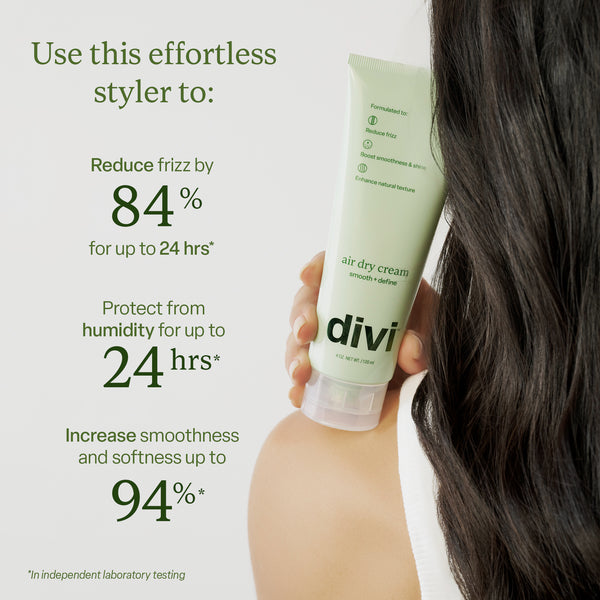

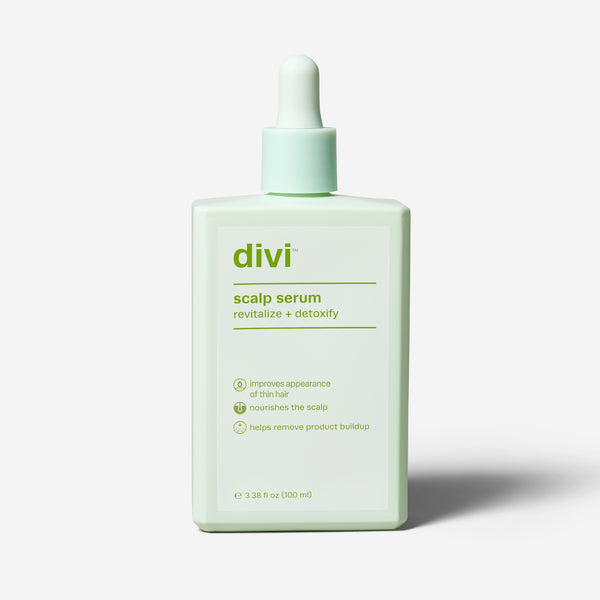

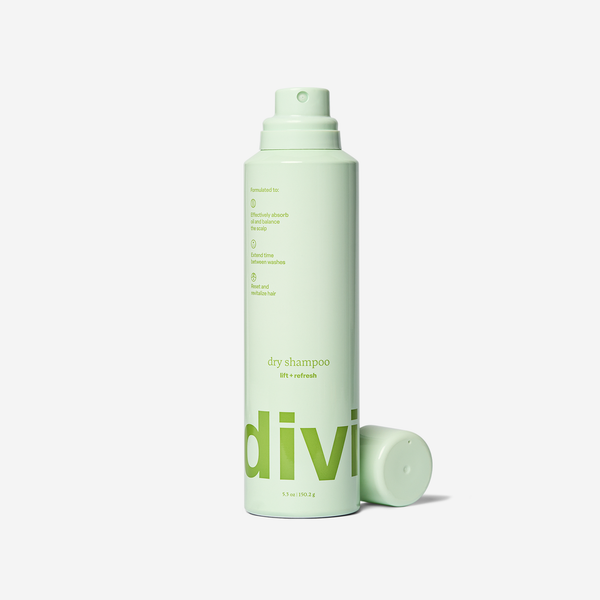

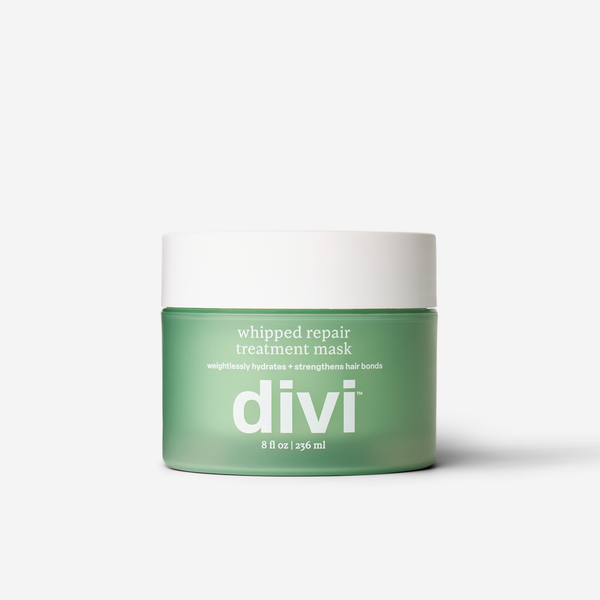
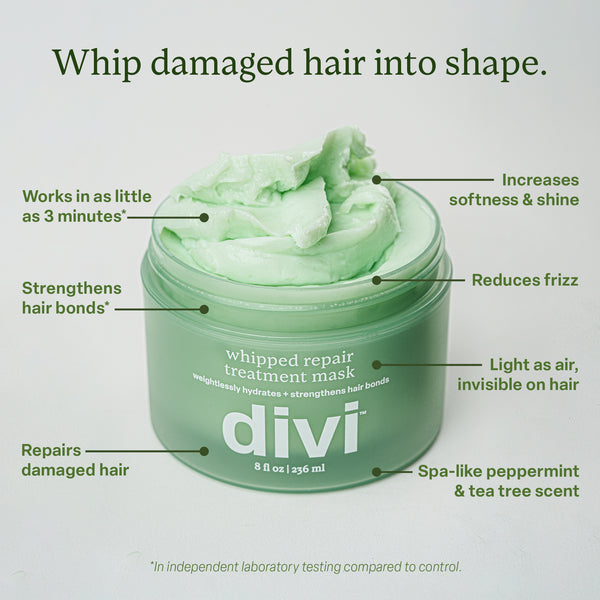
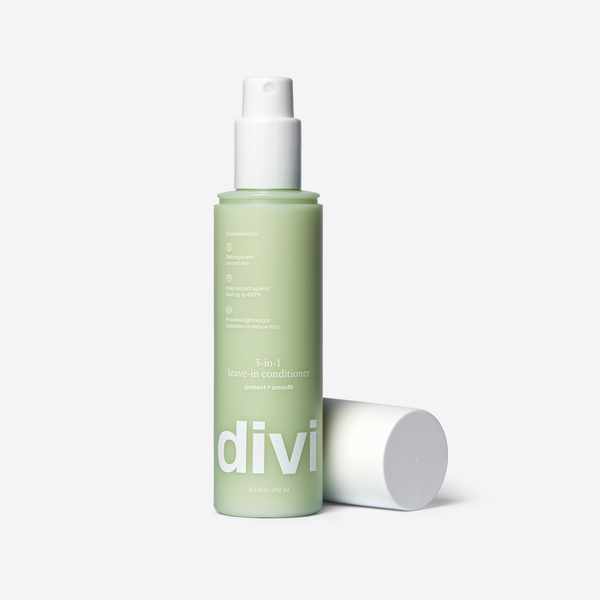

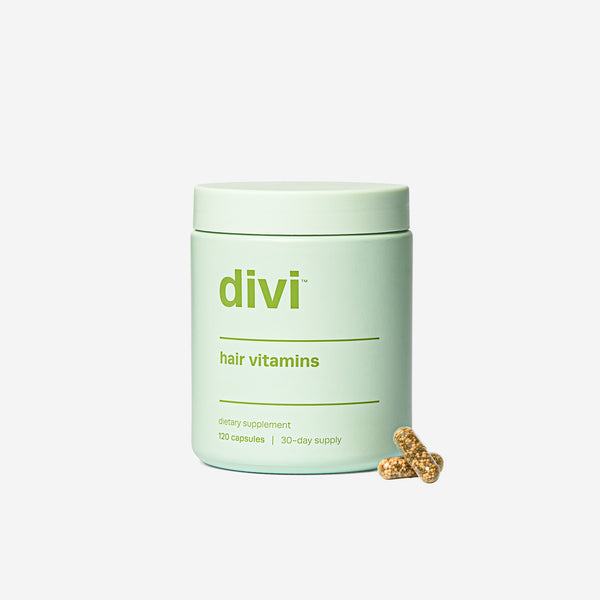
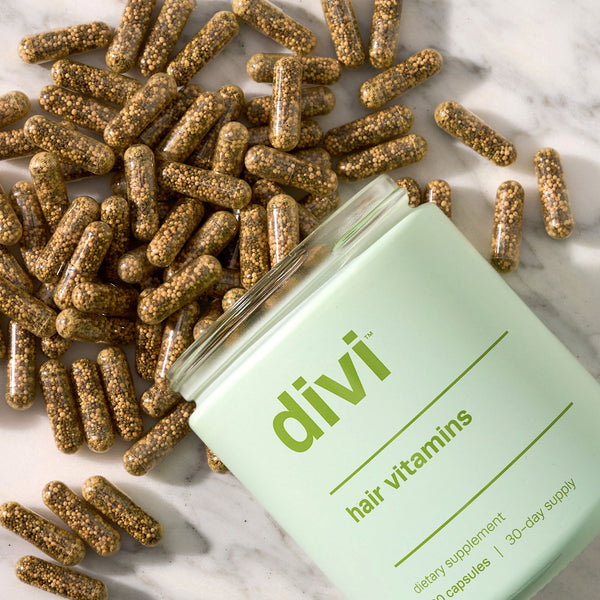
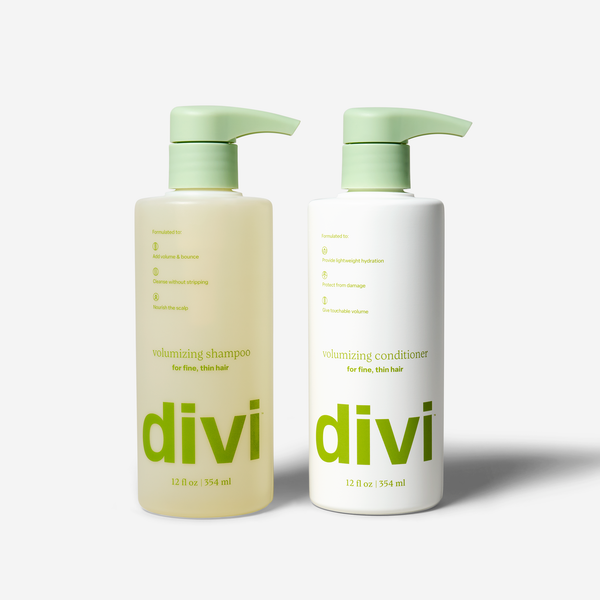





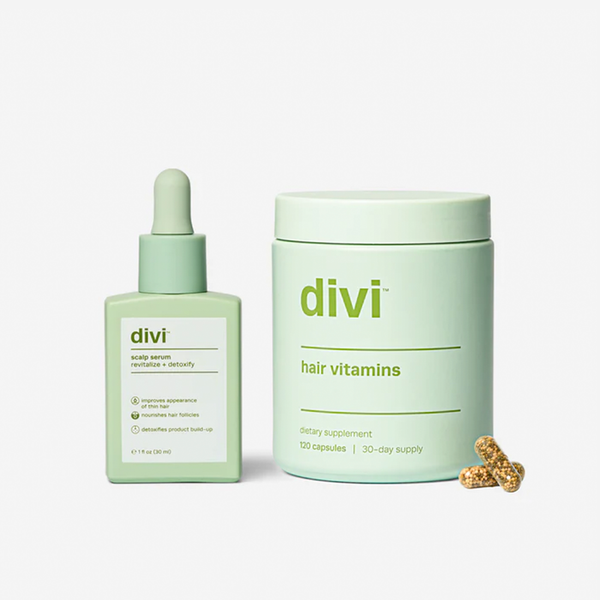
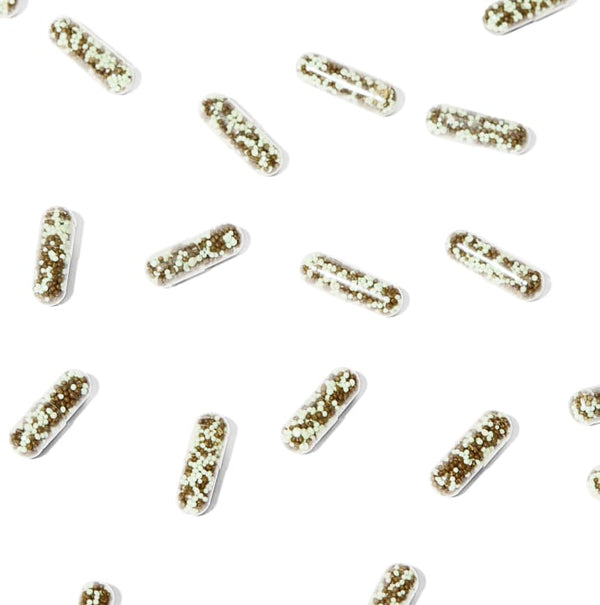
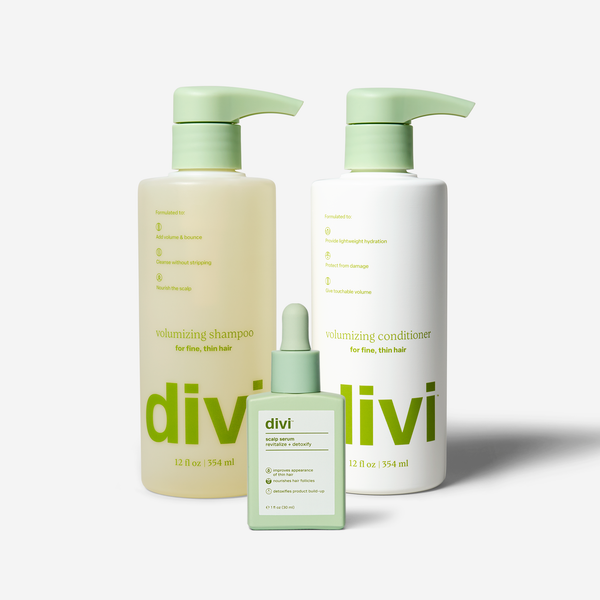
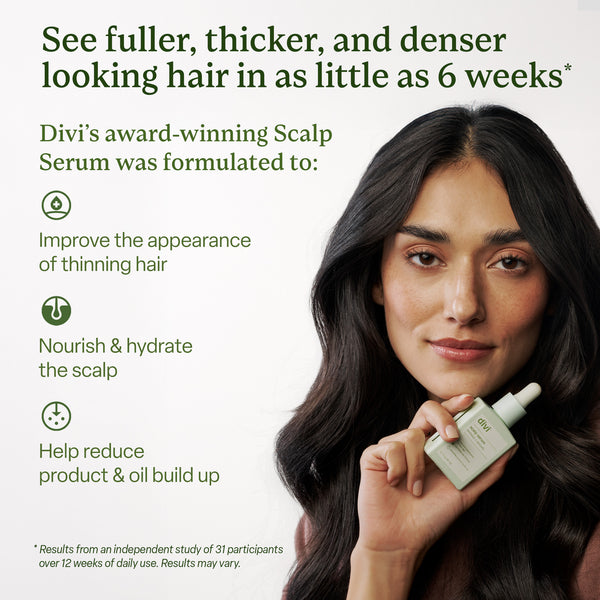



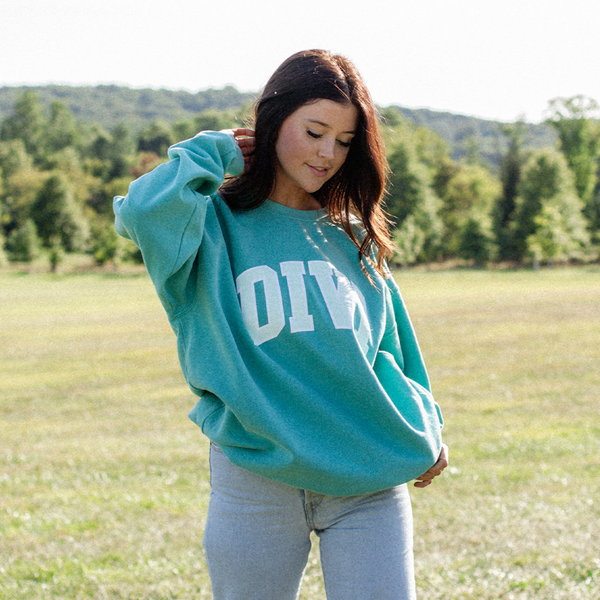







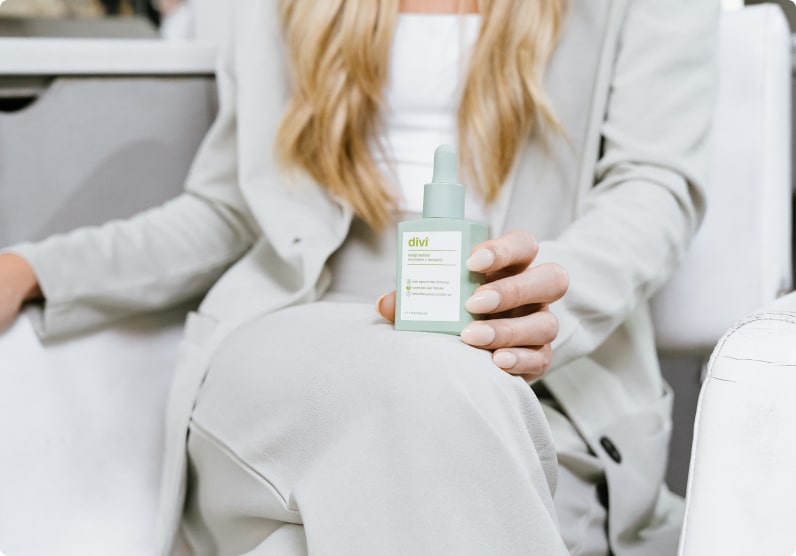






 30ml Scalp Serum
30ml Scalp Serum
 100ml Scalp Serum
100ml Scalp Serum
 Volumizing Shampoo
Volumizing Shampoo
 Hydrating Shampoo
Hydrating Shampoo
 Travel-Sized Volumizing Shampoo
Travel-Sized Volumizing Shampoo
 Travel-Sized Hydrating Shampoo
Travel-Sized Hydrating Shampoo
 Volumizing Conditioner
Volumizing Conditioner
 Hydrating Conditioner
Hydrating Conditioner
 Travel-Sized Volumizing Conditioner
Travel-Sized Volumizing Conditioner
 Travel-Sized Hydrating Conditioner
Travel-Sized Hydrating Conditioner
 3-in-1 Leave-In Conditioner
3-in-1 Leave-In Conditioner
 Best Sellers Bundle
Best Sellers Bundle
 Volumizing Starter Bundle
Volumizing Starter Bundle
 Hydrating Starter Bundle
Hydrating Starter Bundle
 The Healthy Hair Bundle
The Healthy Hair Bundle
 Hair Vitamins Trio
Hair Vitamins Trio
 Dry Shampoo
Dry Shampoo
 Hair Vitamins
Hair Vitamins
 Volumizing Shampoo & Conditioner
Volumizing Shampoo & Conditioner
 Travel-Sized Volume Duo
Travel-Sized Volume Duo
 Hydrating Shampoo & Conditioner
Hydrating Shampoo & Conditioner
 Travel-Sized Hydrating Duo
Travel-Sized Hydrating Duo
 Travel-Sized Dry Shampoo
Travel-Sized Dry Shampoo
 Travel-Sized Dry Shampoo Trio
Travel-Sized Dry Shampoo Trio
